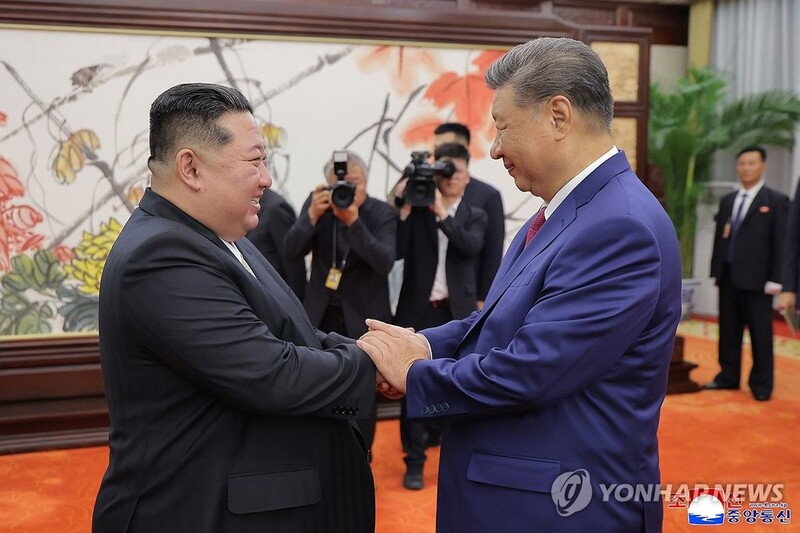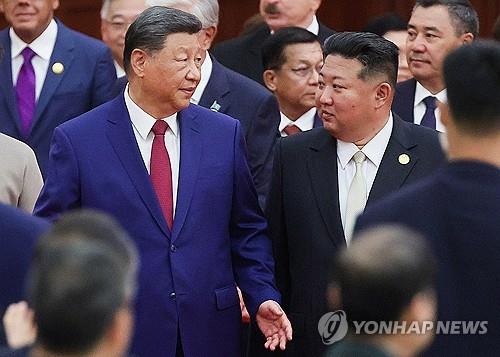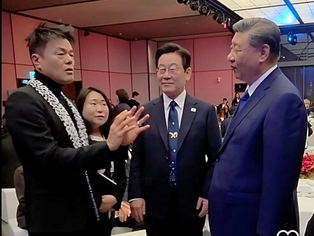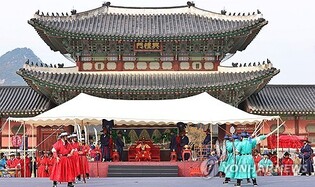 |
| ▲ This photo, published by North Korea's Korean Central News Agency on Sept. 5, 2025, shows leader Kim Jong-un (L) holding hands with Chinese President Xi Jinping during their talks the previous day. (For Use Only in the Republic of Korea. No Redistribution) (Yonhap) |
 |
| ▲ This photo, published by Tass on Sept. 3, 2025, shows North Korean leader Kim Jong-un (R) appearing next to Chinese President Xi Jinping at a reception following China's military parade in Beijing. (PHOTO NOT FOR SALE) (Yonhap) |
(News Focus) N Korea-China
(News Focus) Kim-Xi pledge to boost cooperation brings China's denuclearization goal into limbo
SEOUL, Sept. 5 (Yonhap) -- North Korean leader Kim Jong-un and Chinese President Xi Jinping's pledge to increase cooperation, including in the economy, could put Beijing's long-standing goal of denuclearizing the Korean Peninsula in limbo, experts said Friday.
The previous evening, Kim and Xi held talks in Beijing, their first meeting in more than six years, while Kim was visiting Beijing to attend China's military parade on Wednesday.
Xi hailed China and North Korea as "friends who share a common destiny," saying China "highly values" the bilateral friendship. He expressed support for strengthening and advancing ties with North Korea, stressing that this stance will never change no matter what, according to Chinese and North Korean state media.
Kim stressed his readiness to deepen "mutually beneficial" economic and trade cooperation with China, expressing willingness to increase bilateral exchanges at various levels.
The leaders' pledges signal the North Korea-China relations may see a rapid increase in economic cooperation and high-level exchanges, bringing their ties, strained by Pyongyang's military alignment with Russia, back on track.
Observers, however, warn restoring China's economic cooperation with North Korea could undermine Beijing's long-running goal of denuclearizing Pyongyang at a time when the North has maintained its stance of "never giving up" its nuclear weapons.
They point out that China's rolling out the red carpet for Kim's international diplomatic debut at the parade is tantamount to turning a blind eye to Pyongyang's illegal development of nuclear programs.
China has long maintained a policy stance in support of denuclearizing the Korean Peninsula, albeit perhaps only superficially.
The outcome of the latest talks, however, made no mention of Korean Peninsula denuclearization, marking a major departure from the four summits Kim and Xi held between 2018 and 2019.
The omission came as Pyongyang remains adamant about seeking recognition as a nuclear-armed country. In a statement last month, Pyongyang called its nuclear weapons program "the prestige and honor of the state," vowing that it will remain "unchanged in our stand not to abandon the nuclear weapons."
The regime has also recently warned it will not engage in dialogue with the United States if Washington's aim is to denuclearize the country.
China's pledge of support for North Korea against this backdrop could be tantamount to "recognizing North Korea's ultimate goal of securing a strategic status through the advancement of its nuclear weapons," Hong Min, a senior researcher at South Korea's Korea Institute for National Unification, said.
"China may make it a custom not to mention denuclearization anymore" following the latest talks, he warned.
Analysts also said that China's apparent turnaround in its denuclearization stance may reflect its growing need to recover influence over North Korea, particularly at a time of increasing geopolitical uncertainties amid a stiffening China-U.S. rivalry.
Growing prospects for the resumption of dialogue between North Korea and the U.S., fueled by U.S. President Donald Trump's interest in reopening a summit with Kim, may have also prompted China to reach out to North Korea again, said Yang Moo-jin, president of the University of North Korean Studies in Seoul.
"It may be a direct message from China that it will take the lead in future (North Korea-U.S.) negotiations" once they begin, Yang said.
He also voiced concerns that it may be too early to conclude that China is discarding its denuclearization goal, saying that its recent moves may reflect a calculation that no realistic progress in denuclearizing North Korea is possible now under the current circumstances.
(END)
(C) Yonhap News Agency. All Rights Reserved


















![[풀영상] 지니 TV '아이돌아이' 제작발표회|최수영 SNSD SOOYOUNG·김재영 Kim Jaeyeong|'I DOL I' Press Conference](/news/data/20251216/p179563204418999_319_h.jpg)















